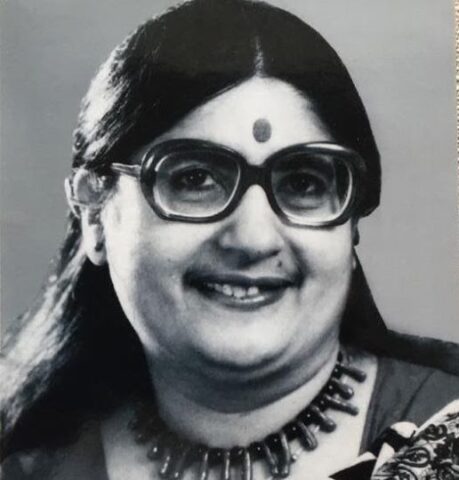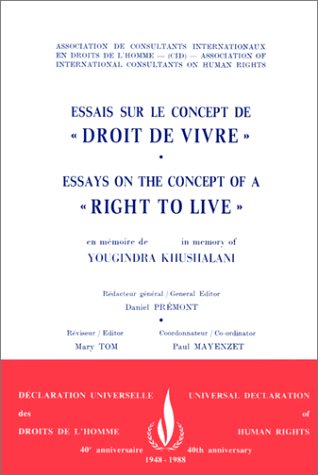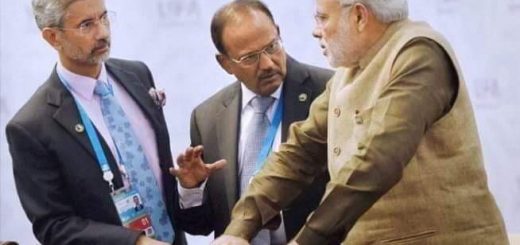Essays on the Concept: “RIGHT TO LIVE” / Homage to Yougindra Khushalani
This ESSAYS on the Concept of a “RIGHT TO LIVE” by Marion Harroff–Tavel
In memory of Yougindra Khushalani

Just as peace is not simply the absence of war, but rather a dynamic process of co-operation among peoples, life is not simply the antithesis of death, but rather a period of time during which every human being should be able to develop fully in dignity and in enjoyment of the respect of others. This was the profound conviction, imbued with humanity and solidarity with the most vulnerable among us, that inspired Yougindra Khushalani, an eminent Indian lawyer and Vice President of the Association of International Consultants on Human Rights (CID), to conceive the idea of a “right to live“. It is to this intelligent, highly motivated and courageous woman, whose own life ended so tragically early, that the authors of this collection of essays* pay tribute by developing the ideas that were so dear to her, each in his own special sphere of interest. All the contributors are eminent figures in the world of human rights and international humanitarian law, which she studied in depth during a period spent at the International Committee of the Red Cross.
How does the “right to live” differ from the more familiar “right to life“?
The right to life, guaranteed by numerous provisions of human rights instruments and international humanitarian law, is specifically asserted in the International Covenant on Civil and Political Rights, which permits no derogation from this right, even when an exceptional public emergency is threatening the life of a nation. As stated in Article 6 of the Covenant, it is an “inherent right” of every human being. The article goes on to say: “That right shall be protected by law. No one shall be arbitrarily deprived of his life”. Several paragraphs of the same article deal with the death penalty, which is also the subject of an essay in the book, based on the preparatory work in drafting the Covenant.
The “right to live” is an extension of the “right to life“. To live is more than simple existence; it implies the enjoyment of living conditions conducive to the full development of the human person. To have enough food, a home, adequate education and medical care, to be able to work under proper conditions, to move about and express oneself freely, to grow up in a healthy and peaceful environment where all traditions and cultures are respected; these are some aspects of the “right to live”. Furthermore, during the time given him, from birth to death, every individual should be free from fear, fear of insecurity, fear of ill-treatment, torture, “disappearance”, summary execution or the menace represented by the arms race. Even in wartime, indeed, particularly in such circumstances, a “margin of humanity” must be preserved thanks to international humanitarian law. It is difficult to sum up in a few lines the rich content of this work, which covers a score of subjects such as the right to a decent environment, to development and to communications, and the issues of peace, disarmament and scientific and technological progress. Several of the problems involved in giving effect to the “right to live” are also taken up: the role that could be played by the many existing voluntary organizations in improving the quality of life, the protection of migrant workers, the impact of the “brain drain” on developing countries, the “right to live” in the African context, the right of children to be protected from death, disease and exploitation. Finally, the right to be different—from the point of view of a woman from the Third World, Yougindra Khushalani, who attached the greatest importance to the need to respect the cultural identity of peoples. The book concludes with several essays on State responsibility for the protection of the “right to live”.
This publication is far from being a heterogeneous collection of mismatched opinions; it is a harmonious work which illuminates the central theme of the right to live from various angles. In this respect the task undertaken by the general editor, Daniel Premont, has proved a success.
Is now the right time to put forward a new human right on the basis of the concept of a “right to live“? Isn’t this idea in effect a synthesis of all human rights? These questions remain open, and it is up to each reader to form his own opinion. The value of this “comprehensive and evolutive” concept of human rights, to borrow the title of one section of the book, seems to us to be essentially an educational matter. As one of the authors says, work to raise young people’s awareness of human rights issues must not be limited to providing them with information, but must help prepare them to live together in harmony in tomorrow’s society, a society which the adults of today find it difficult to imagine. This is a major and difficult educational undertaking. An approach to the problems of the human community based on the concept of the “right to live” would help stir the awareness of children to values such as respect for life and tolerance, would open their eyes to the realities and diversity of the world and, most important, would give them a sense of their own responsibility by making them realize that solidarity among human beings is the source of collective and individual fulfilment.
Marion Harroff–Tavel
- *Essays on the concept of a “Right to Live”, in memory of Yougindra Khushalani, Bruylant, Brussels, 1988,324 pp., bilingual, English and French. Daniel Pr6mont, general editor, Mary Tom, editor, Paul Mayenzet, co-ordinator, Association of International Consultants on Human Rights (CID).

Other Links to Dr. Yougindra Khushalani
https://onevorld.org/2020/02/23/dr-miss-yougindra-khushalani-endowmentlecture-in-mumbai-university/




Dearest family, Today we remember with love and reverence our dearest and respected Yogi Masi on her birth anniversary- November 30th. We are honored and privileged to have known her and be the recipients of her love and blessings. She is a role model for all, especially women. She was a brave soul who gave selflessly to the cause so dear to her. Her tireless work to bring to the notice of the world the plight of women in some parts of the world and her fight for the dignity and honor of women – continues even today. As mentioned in one of the citations in her honor – if she were alive, she could have won a Nobel Prize. Her laughter, her zest for living, her giving and loving heart along with so many other wonderful qualities we continue to miss. We are so proud to be related to her and I personally have so many cherished memories of her and had the good fortune of spending time with her. May we aspire to honor her legacy. Love and respects to the elders and love to all. God bless